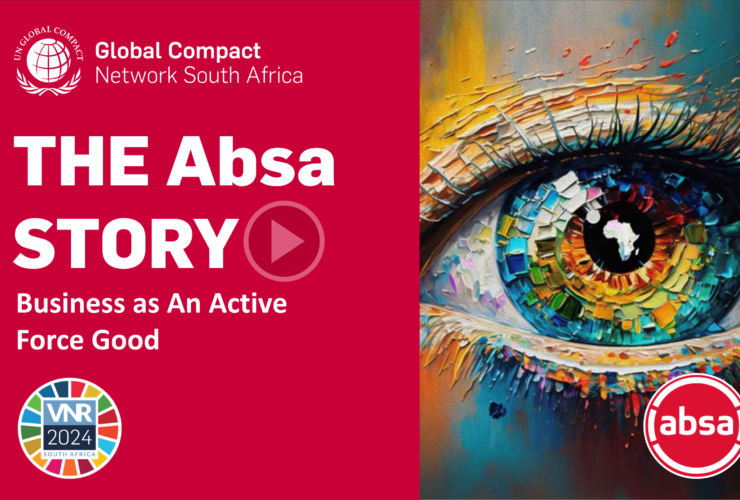UNITED NATIONS, New York, 8 September 2022 — The UN Global Compact launched new guidance today for business to ensure the substantial benefits of the transition to a green economy are shared widely, and support workers’ rights and livelihoods.
Introduction to Just Transition — A Business Brief, developed by the Think Lab on Just Transition, provides an introduction to the central role of the private sector in ensuring a just transition for all, covering just transition’s foundation and meaning; priority actions for companies; relevant areas of work and the business case, as well as a glossary of key terms and a resource guide.
The guidance showcases how business action begins from a foundation of responsible business conduct and respect for rights, supported by the Ten Principles of the United Nations Global Compact, to enable transition planning that is based on social dialogue and stakeholder engagement that optimizes social, economic and employment impacts on the journey to net-zero emissions and environmental sustainability.
Introduction to Just Transition – A Business Brief builds on the guiding principles of just transition established in the International Labour Organization’s “Guidelines for a just transition towards environmentally sustainable economies and societies for all”. António Guterres, the UN Secretary-General and Chair of the UN Global Compact Board has called on all countries to adopt the ILO Guidelines as a minimum standard for simultaneously addressing the environmental, economic and social dimensions of sustainable development.
Sanda Ojiambo, Assistant Secretary-General; Executive Director & CEO of the UN Global Compact said: “By outlining concrete actions and unpacking the business case for a just transition, the Introduction to Just Transition — A Business Brief will help businesses realize their full potential in making the transition to net-zero just and equitable and ensure that their actions result in meaningful, inclusive impacts.”
While the principles of just transition are universal, companies apply them differently as climate change and the climate transition affects geographies, industries and companies in varied ways. This Brief highlights some of these differences and outlines seven priority actions to help all companies understand just transition’s principles, identify gaps in current practices and generate ideas for improving alignment, including:
- Creating a map for internal engagement on just transition;
- Setting a foundation through robust policies and practices to respect rights at work and other human rights;
- Engage with worker organizations in social dialogue including all affected stakeholders at the discussion table;
- Making long-term business plans that integrate just transition principles;
- Taking action to carry out just transition plans;
- Partnering with governments, employer organizations, regional/sectoral initiatives, and across supply chains for more coordinated action;
- Measuring and reporting actions, challenges and impacts related to just transition, to promote learning, cooperation, and accountability.
To learn about the priority actions for businesses and for additional insights, please read the Brief.
Notes to Editors
About the Think Lab on Just Transition
The Think Lab on Just Transition aims to shape and define business and thought leadership on critical areas linked to just transition; address key business challenges; identify policy advocacy opportunities and good business practices; and scale-up learnings through the UN Global Compact’s network. 27 company participants from across the globe include A.P. Møller – Mærsk, Accenture, AIA Group, CEMEX, DP World, Enara Capital, Enel SpA, Garanti BBVA, Iberdrola, Johnson Controls, Lenovo Group, LONGi, Mahindra Group, Majid Al Futtaim, Meta, Microsoft, Moody’s Corporation, National Australia Bank, Nestlé, Novozymes A/S, Ørsted, ReNew Power Pvt. Ltd., Sappi Southern Africa Ltd., TriCiclos, Unilever, Wipro Ltd. and Woolworths Holdings Limited. The partners of the Think Lab include UN Climate Change (UNFCCC), UN Environment Programme (UNEP), International Labour Organization, International Trade Union Confederation (ITUC) and its Just Transition Center, CDP, Duke University, International Organization of Employers (IOE), International Renewable Energy Agency (IRENA), Principles for Responsible Investment (PRI), Stockholm Environment Institute (SEI), Sustainable Energy for All (SEforALL), The B Team, UNICEF and World Resources Institute (WRI). Think Lab activities leverage synergies with the UN Global Compact’s “CFO Coalition for the SDGs” and the “Just Transition Maritime Task Force”.
About the United Nations Global Compact
As a special initiative of the UN Secretary-General, the United Nations Global Compact is a call to companies everywhere to align their operations and strategies with Ten Principles in the areas of human rights, labour, environment and anti-corruption. Our ambition is to accelerate and scale the global collective impact of business by upholding the Ten Principles and delivering the Sustainable Development Goals through accountable companies and ecosystems that enable change. With more than 15,000 companies and 3,000 non-business signatories based in over 160 countries, and 69 Local Networks, the UN Global Compact is the world’s largest corporate sustainability initiative — one Global Compact uniting business for a better world.






